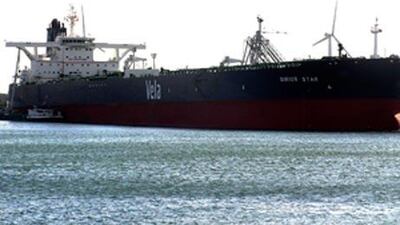Rotterdam, the biggest port in Europe, is running out of space to store crude oil as tanker deliveries continue to pour in faster than the oil is moved on to local refineries. As a result, tankers are being diverted from the port, which also serves as Europe's largest oil-refining centre. Other ships are waiting outside the harbour until storage space for crude becomes available.
About 75 million barrels of oil can be stored at Rotterdam's port facilities - roughly five days of supply for the 27-nation EU. Even so, "a lot of tanks are fully loaded", Jeroen Kortsmit, the manager for commercial affairs at the Dutch maritime information provider Royal Dirkzwager, told Bloomberg. Mr Kortsmit, who joined Dirkzwager 24 years ago, said he had never seen the port's storages so full.
The oily high tide in western Europe's industrial and commercial heartland mirrors a development in the US this year. Crude inventories at the nation's main storage facility at Cushing, Oklahoma, the delivery point for crude futures contracts on the New York Mercantile Exchange, rose to a record 34.3 million barrels in February. Some of that oil has been moved to refineries in the US Midwest during the past few weeks, but that has simply caused the refineries' storage tanks to fill up. Total US crude inventories reached almost 375 million barrels last week, after rising by more than 4 million barrels in the week ending on April 24, according to the latest government data.
Global stockpiles of some refined petroleum products, such as diesel, are also climbing. The investment bank Goldman Sachs, which is one of the world's top energy traders, said this week that global storage capacity for the fuel could be "exhausted" by the end of June. According to Raja Kiwan, an analyst with PFC Energy, the near-record levels of oil inventories throughout the industrialised world are likely to persist for at least a few months.
"We won't see a real decline in stocks before the third quarter," he said. "I'm not surprised that stocks are still very high." That is because implementation of OPEC production cuts announced last year did not begin in earnest until February, when a steep drop in oil demand was already well under way. The oil exporters' group has pledged to reduce output by a record 4.2 million barrels per day and continues to work towards full compliance with that target ahead of its next meeting, set for May 28. On Tuesday, Abu Dhabi National Oil Company said it would further reduce its crude exports in June to fulfil its OPEC obligations.
The lag in implementing the OPEC cuts, combined with weakening oil demand, points to the supply overhang persisting. Citing weak demand for industrial fuels, Goldman Sachs has set a July price target for crude of $45 a barrel, about 10 per cent lower than the current price. But another factor encouraging higher stockpiles may be easing: the recent marked contango in oil futures, in which contracts for oil for prompt delivery have been priced several dollars per barrel below those for oil held for later delivery, has started to narrow. That has reduced the financial incentive for pumping oil into storage.
For BP, the British oil company that owns almost 20 per cent of the crude storage capacity at Cushing, as well as storage facilities at Rotterdam, oil-trading profits in the first three months of this year were almost US$500 million (Dh1.83 billion) higher than normal due to the contango, helping the company post earnings for the period that beat analysts' expectations. But Byron Grote, the company's chief financial officer, said during BP's earnings conference call that he did not expect the situation to last. He said BP would probably draw off supplies of stored oil during the current quarter, as the contango flattened.
Nexen, a Canadian oil company with storage at Cushing and Hardisty, a Canadian oil centre, is another contango beneficiary. It continues to pump oil into storage, but the rate may slow in coming months. "This has been such a common strategy that people have filled up virtually all the fixed storage around the world, and they've now gone to floating storage to do that as well," Marvin Romanow, the chief executive of Nexen, said on the sidelines of the company's annual meeting, according to Reuters. "But the shape of the forward curve will change, and as it moves down we'll store less oil."
According to Frontline, the world's biggest operator of oil tankers, about 100 million barrels of oil were being stored at sea in supertankers as of April 23. In February, Koch Supply and Trading, the US oil firm, booked a supertanker for six months to store about 2 million barrels off the east coast of the UAE. Most analysts are expecting oil markets to tighten by the end of this year as inventories decline. Goldman Sachs expects crude to rebound to $65 a barrel by the end of the year.
But if regional markets are flooded with oil released from storage, in the absence of a meaningful increase in demand, prices could drop. Oil demand is likely to fall further because of the recession, Peter Voser, the chief financial officer of Royal Dutch Shell, said during a conference call on Wednesday. "In the near term, the next 12 to 18 months, it's difficult to see an uptick in the oil or gas price."
@Email:tcarlisle@thenational.ae

